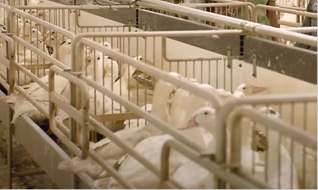Animal welfare
Animal welfare is a prerequisite for the production of foie gras. European producers of foie gras are subject to Directive 98/58/EC concerning the protection of animals kept for farming purposes. In addition, two recommendations on the production of foie gras relating to Muscovy ducks, their hybrids and geese were adopted on 22 June 1999 under the European Convention of 1976 for the Protection of Animals kept for Agricultural Purposes (convention governed by the Council of Europe).
European Charter on breeding of waterfowl for foie gras
Eager to go further than the European legislation, Euro Foie Gras, very concerned about the respect of animal welfare, published in 2011 in the form of a charter the commitments that must govern this farming activity in the spirit of the 12 principles retained in the “Welfare Quality Project”.
- Animals should not suffer from prolonged hunger, i.e. they should have a sufficient and appropriate diet.
- Animals should not suffer from prolonged thirst, i.e. they should have a sufficient and accessible water supply.
- Animals should have comfort around resting.
- Animals should have thermal comfort, i.e. they should neither be too hot nor too cold.
- Animals should have enough space to be able to move around freely.
- Animals should be free of physical injuries.
- Animals should be free of disease, i.e. farmers should maintain high standards of hygiene and care.
- Animals should not suffer pain induced by inappropriate management, handling, slaughter, or surgical procedures.
- Animals should be able to express normal, non-harmful, social behaviours.
- Animals should be able to express species-specific behaviours.
- Animals should be handled well in all situations, i.e. handlers should promote good human-animal relationships.
- Negative emotions such as fear, distress, frustration or apathy should be avoided while positive emotions, such as security or satisfaction, should be promoted.
This charter has been signed by the representatives of all the foie gras producing countries in the European Union.
In addition, it should be noted that several initiatives have also been taken at national level. To find out more, you can consult the page dedicated to our members.
Collective housing
Offering quality of life to animals is a daily concern of any breeder of fat palmipeds who must ensure their welfare, comfort and optimal hygiene at all stages of production. These elements are fundamental for the animal and a prerequisite to obtain a noble product of quality.

Ducks and geese in the foie gras production live 90% of their life outside
Living most of their life outside, palmipeds used for the production of foie gras live in collective housing for a few days during the fattening phase. Beyond the semantics and the negative connotation that can be attached to certain terms, what matters to European foie gras breeders is the real conditions in which their animals are raised and the improvements that can be made.
At the cost of substantial investments, the European waterfowl sector has changed all its equipment in response to the Recommendation of 22 June 1999 of the Council of Europe. Thus, all individual housings – also called “épinettes” – have been replaced by collective housings meeting all the requirements laid down in the Recommendation which states that:
Housing systems for ducks shall allow the birds to:
- stand with a normal posture,
- turn around without difficulty,
- defecate showing normal movements,
- flap the wings,
- show normal preening movements,
- perform normal social interactions,
- carry out normal feeding and drinking movements.»

Individual housings – épinettes – no longer exist in the EU.

Collective housings are being used.
Thanks to research, technical progress has been made to ensure that the housing system meets animal welfare requirements, sanitary imperatives and the ergonomics of the farmer’s work while achieving excellence in production: improvement in equipment, study of optimal dimensions for animals, while allowing the operator who feeds them to make a safe gesture, etc. Euro Foie Gras points out that the progress made, thanks in particular to the research work, has made it possible to halve the duration of the fattening phase, and therefore the time spent by waterfowl in collective housings.
For more information, please consult our document on collective housing.
